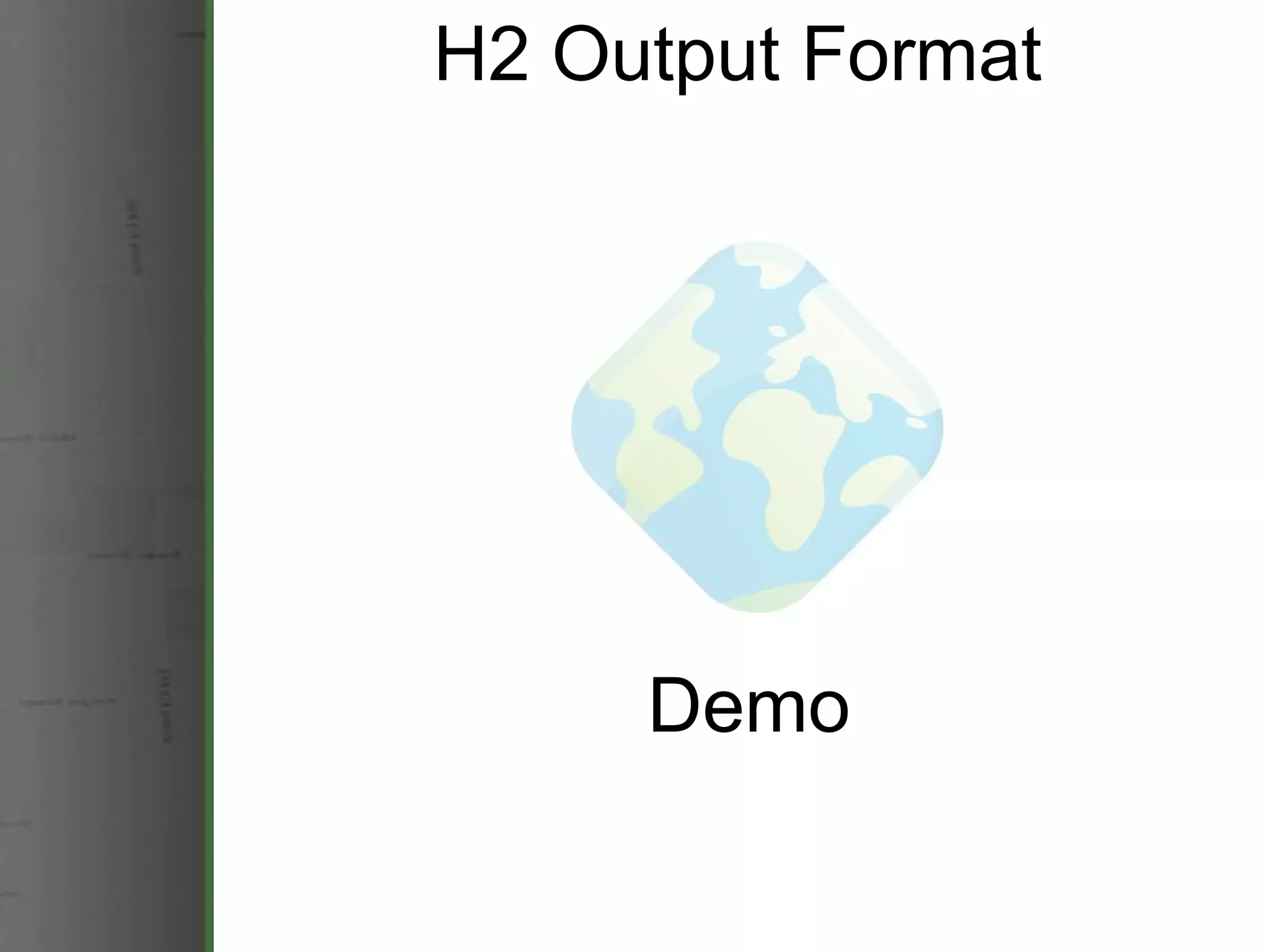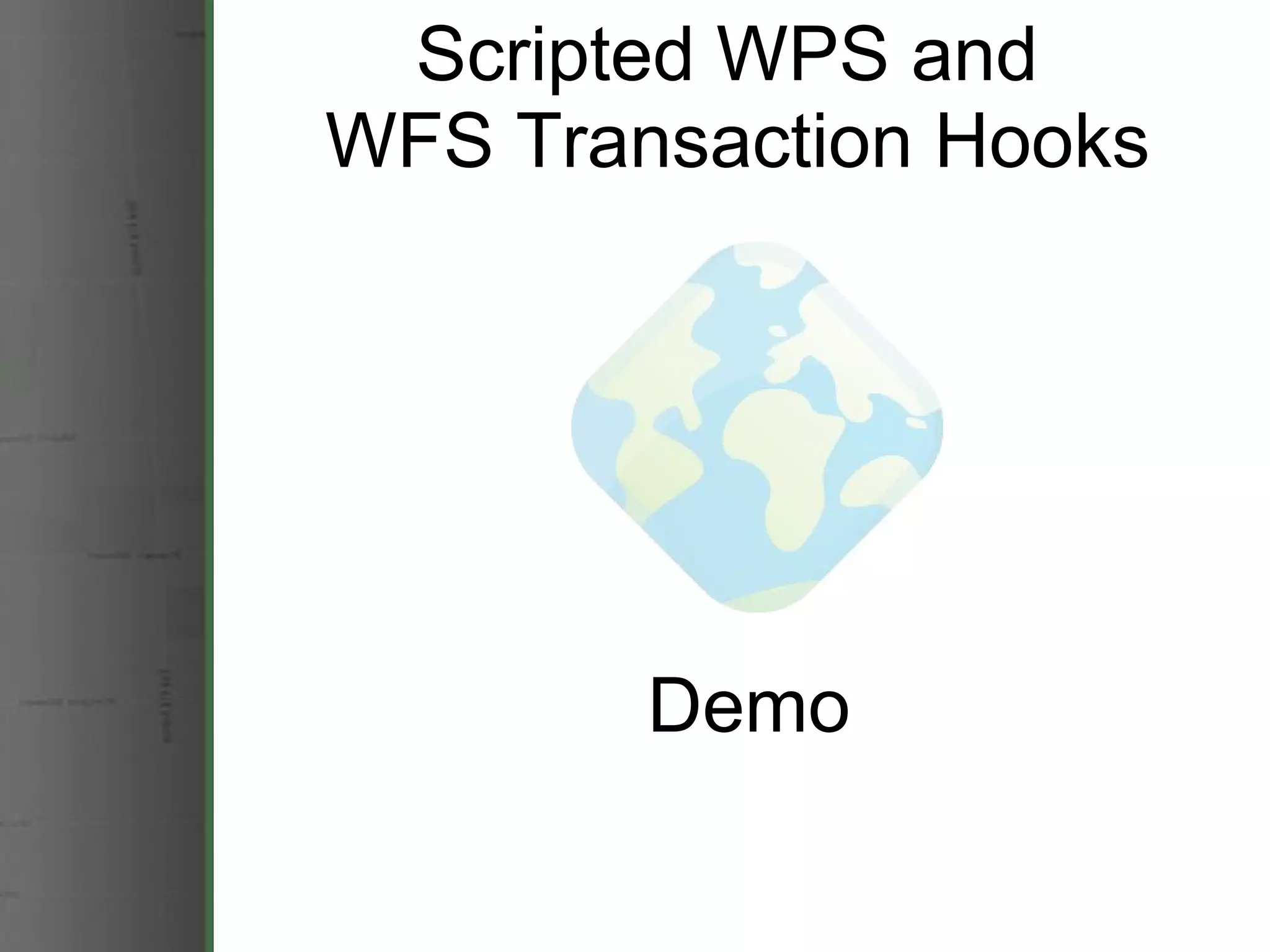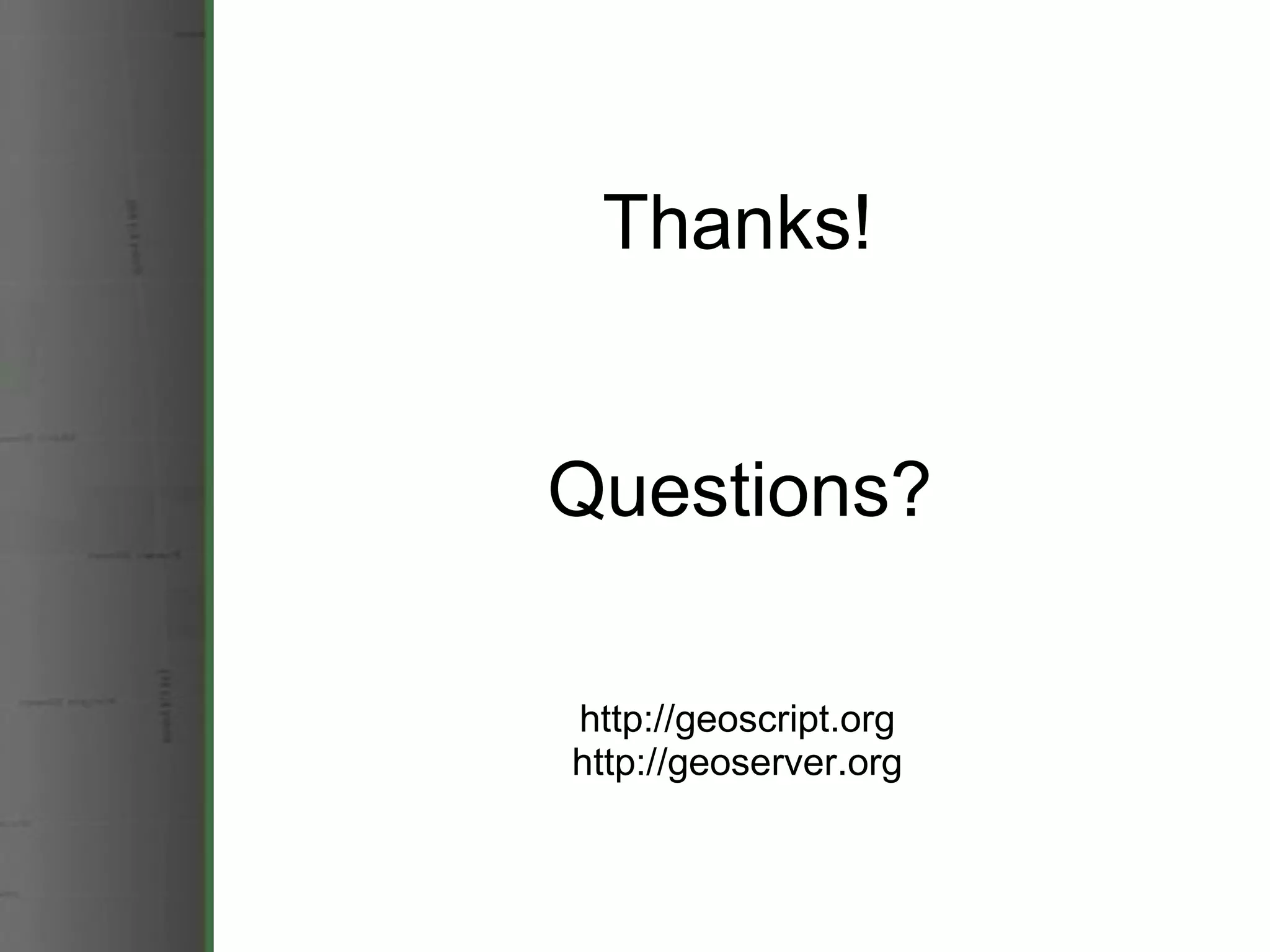The document covers the usage of GeoScript, a scripting language supporting various languages like Groovy, JavaScript, Python, and Scala to interact with GeoServer and spatial data. It details how to script data stores, feature collections, and map layers, and includes examples of process creation, data filtering, and transaction intercepts. Additionally, it explains the integration with Google Fusion Tables and provides information on managing output and input formats within GeoServer.
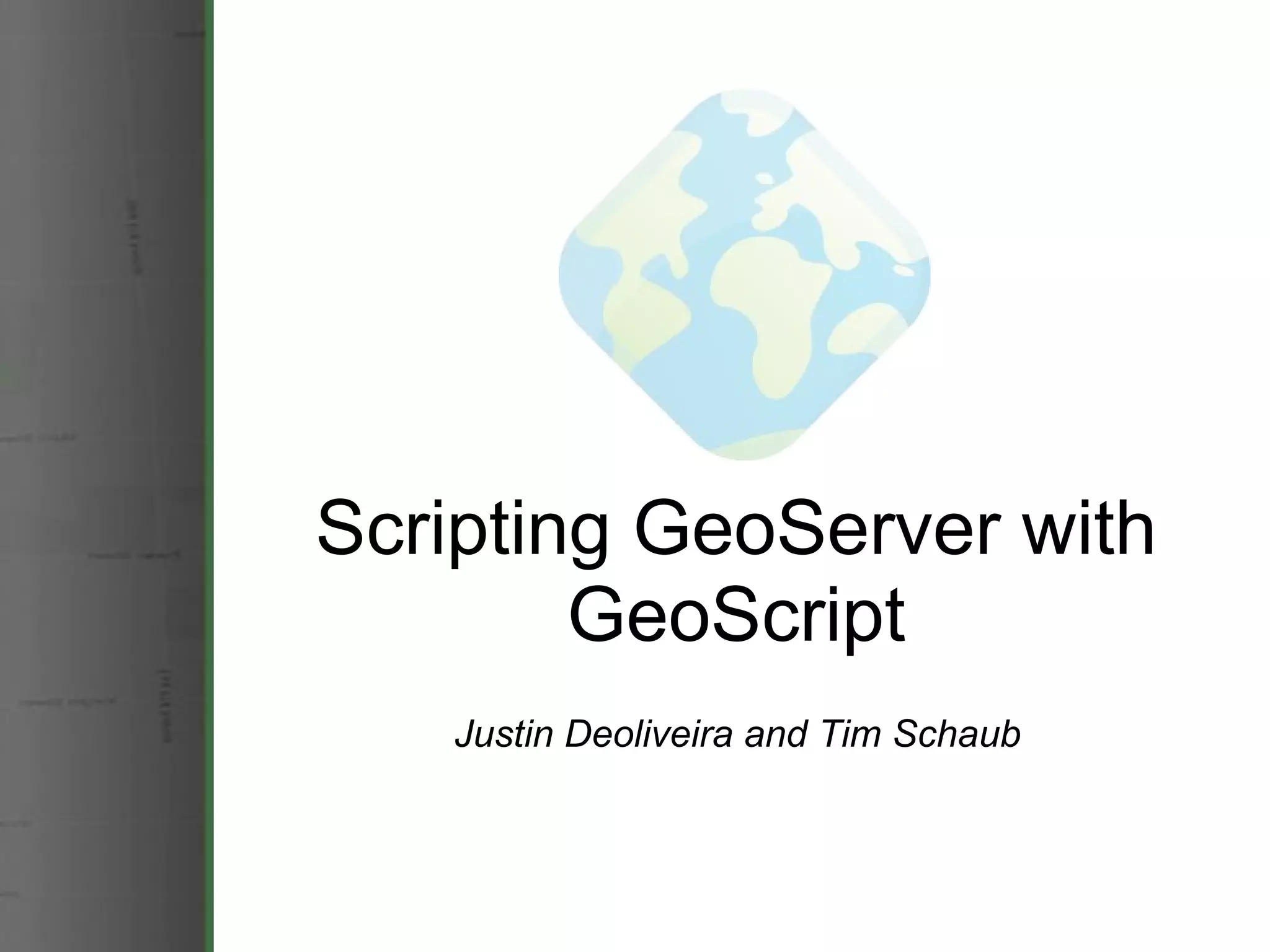
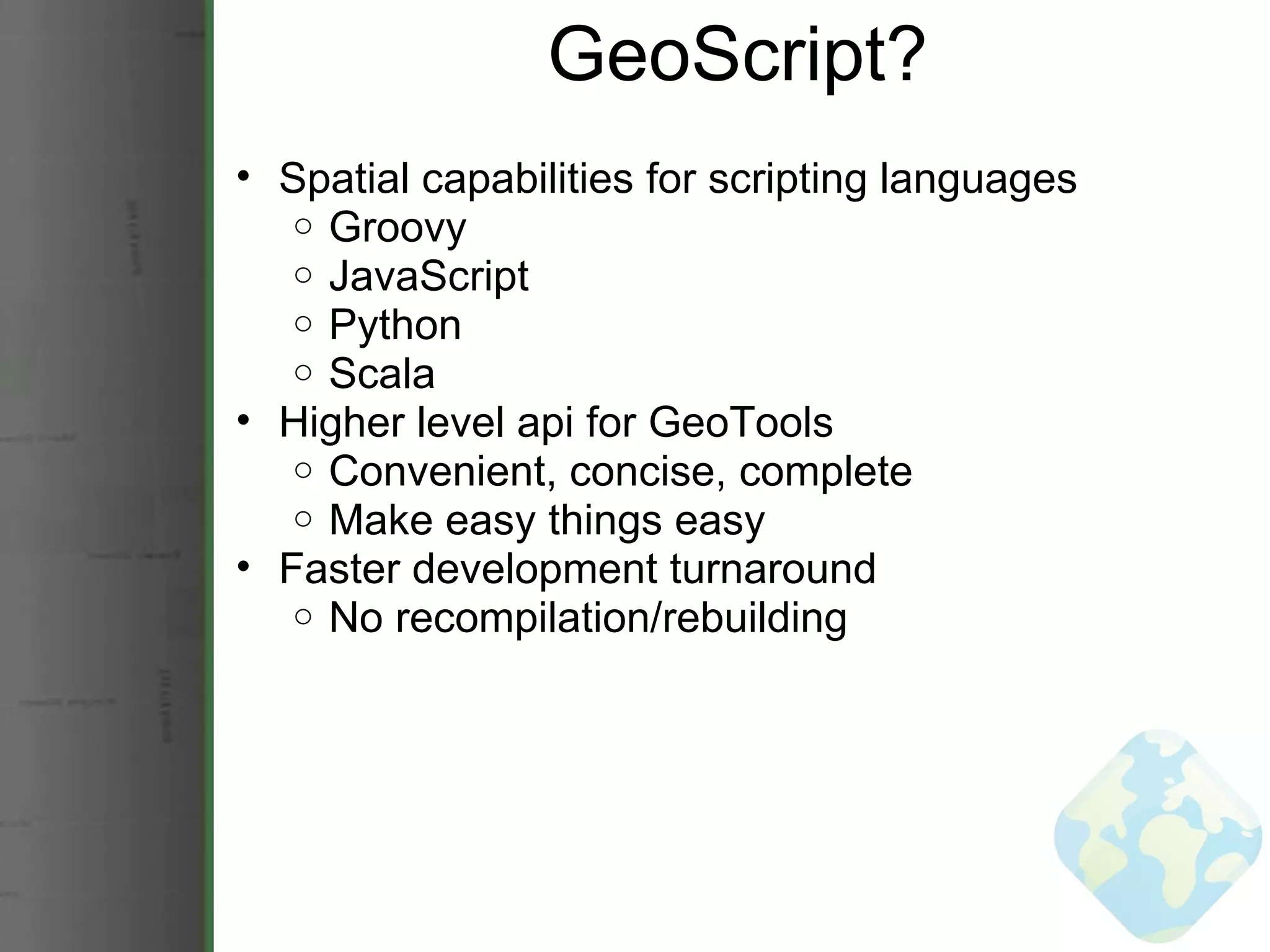
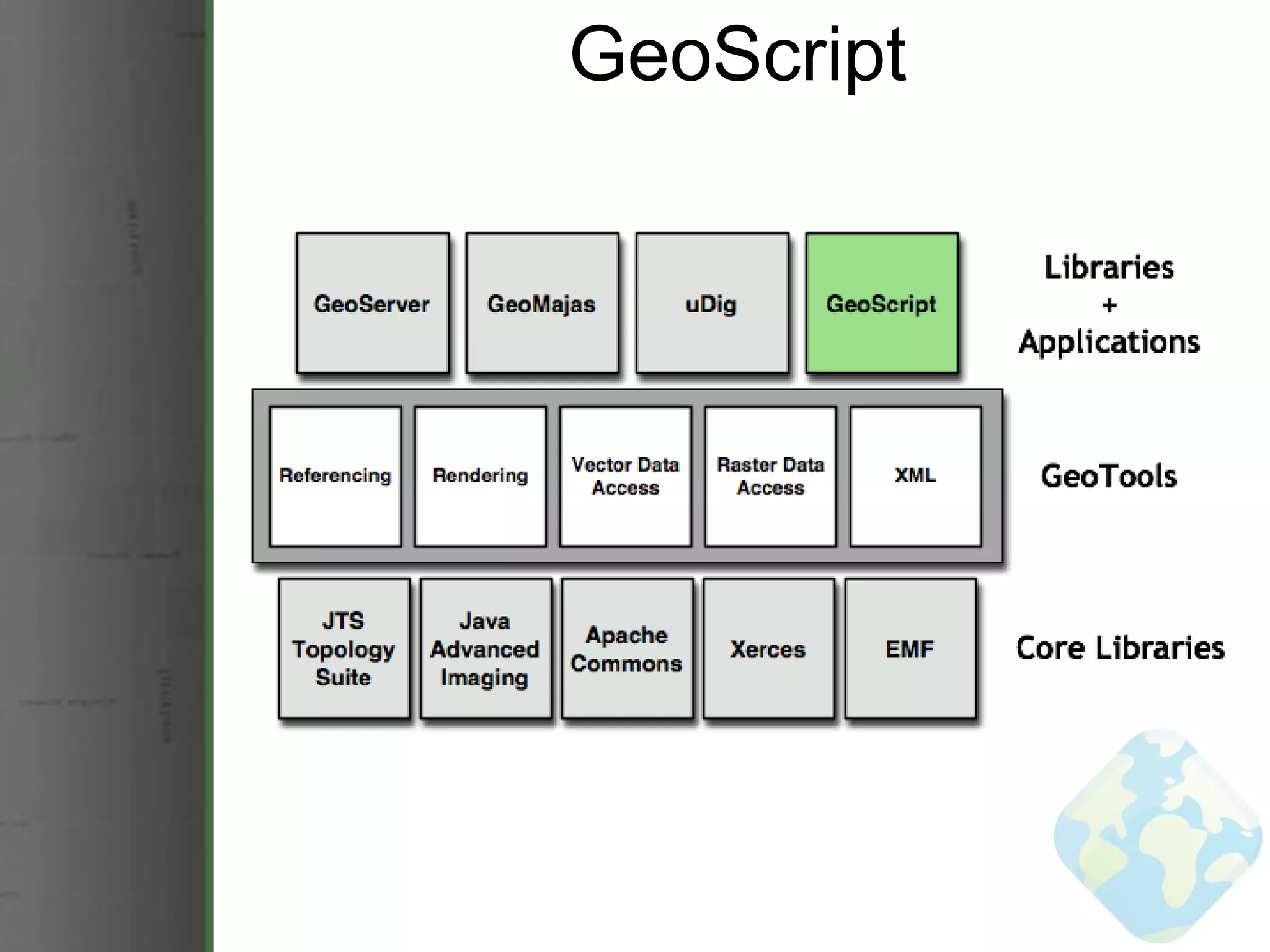
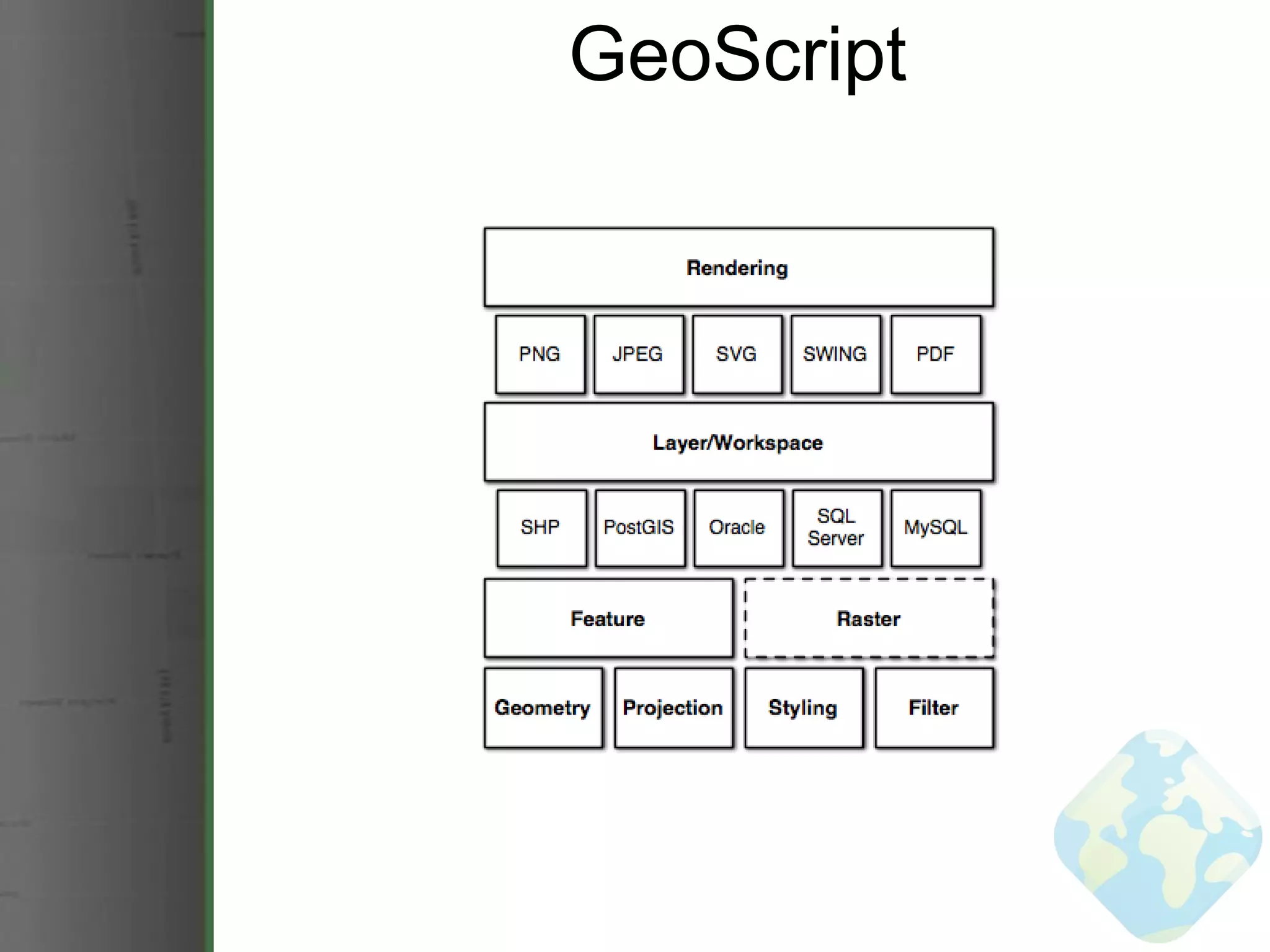
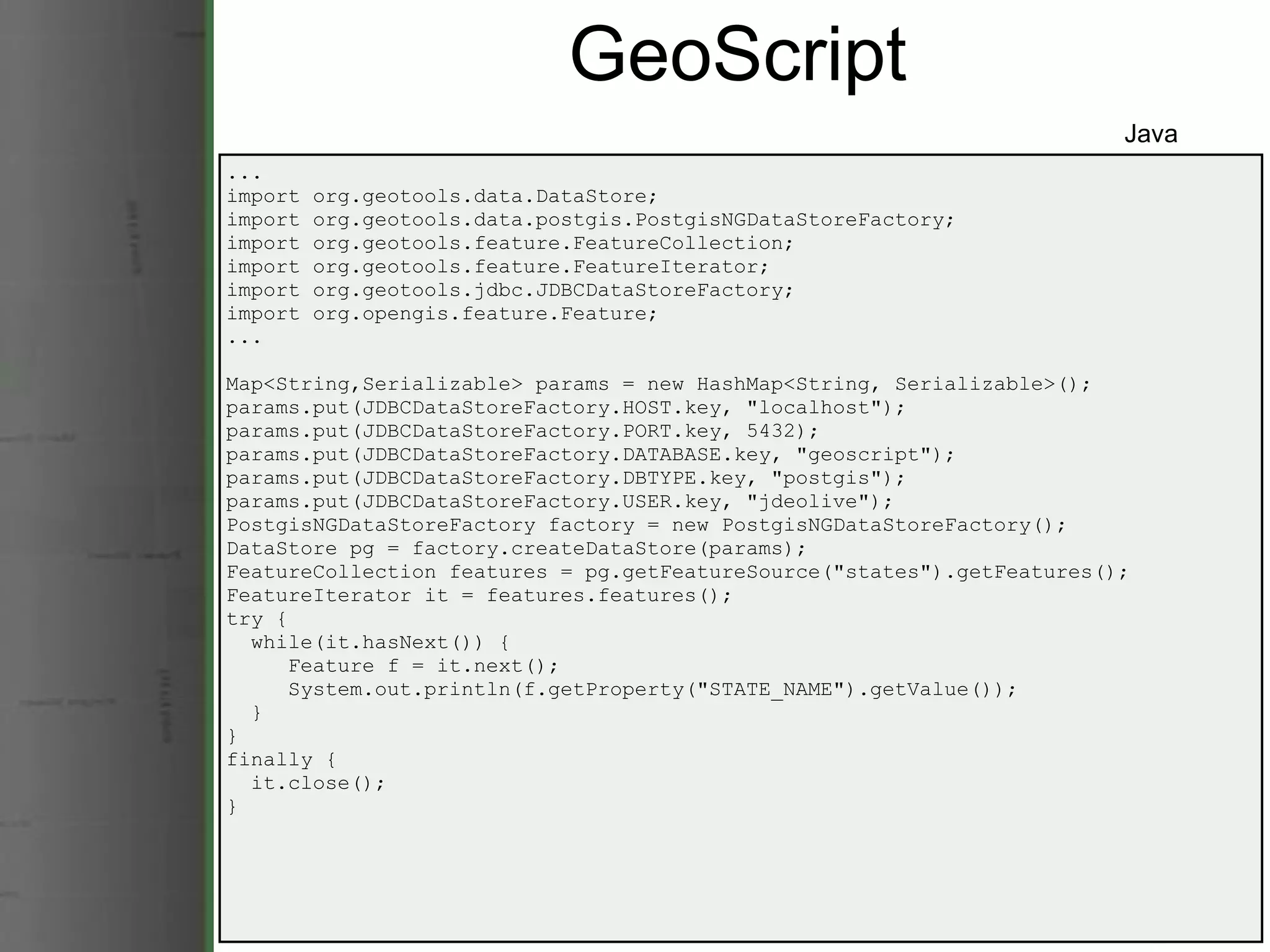
![GeoScript from geoscript.workspace import PostGIS pg = PostGIS('geoscript') for f in pg['states'].features(): print f['STATE_NAME'] Python JavaScript var PostGIS = require("geoscript/workspace").PostGIS; var pg = PostGIS("geoscript"); pg.get("states").features.forEach(function(f) { print(f.get("STATE_NAME")); });](https://image.slidesharecdn.com/scriptinggeoserverwithgeoscript-111003093136-phpapp01/75/Scripting-GeoServer-with-GeoScript-6-2048.jpg)
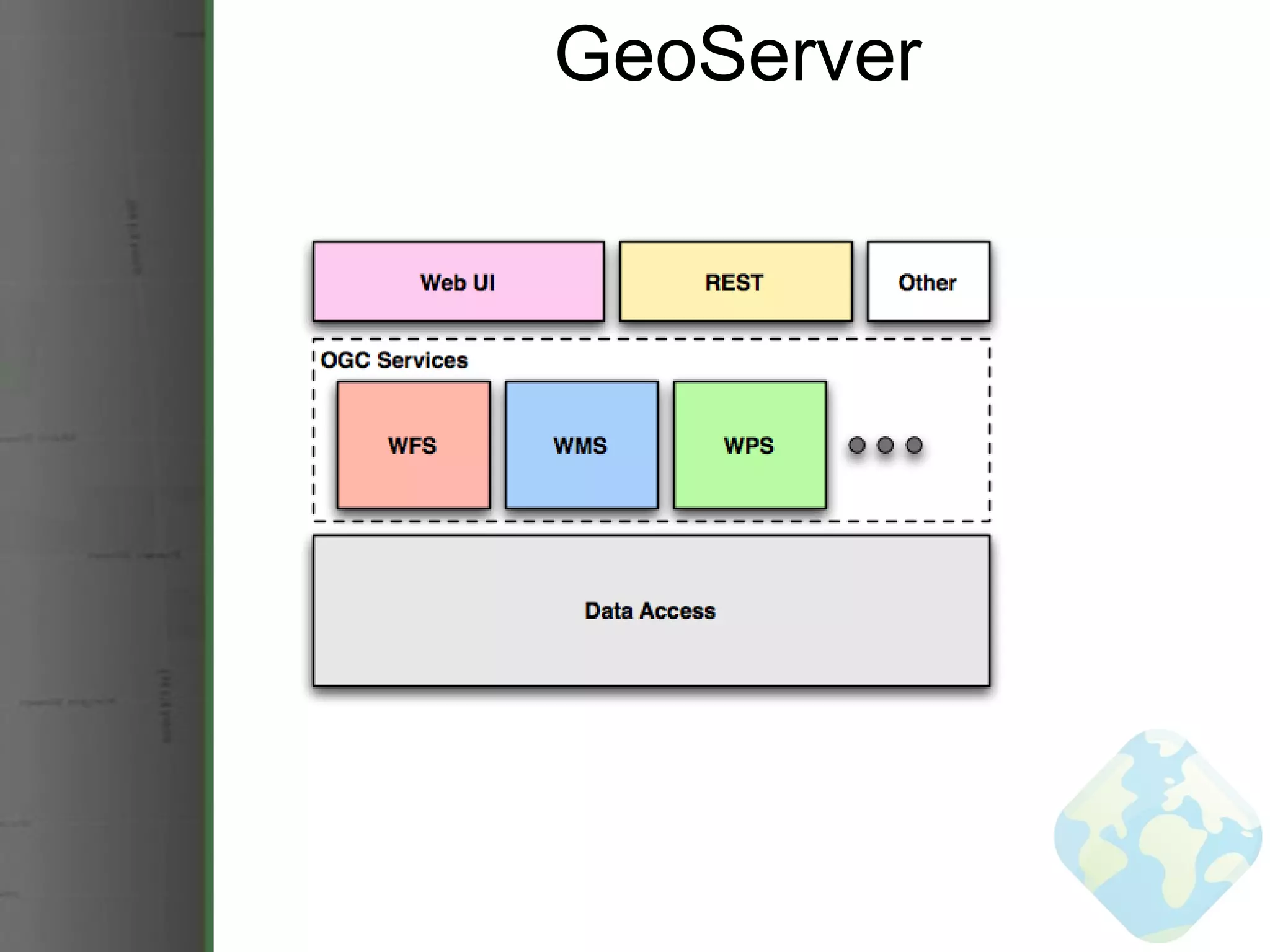
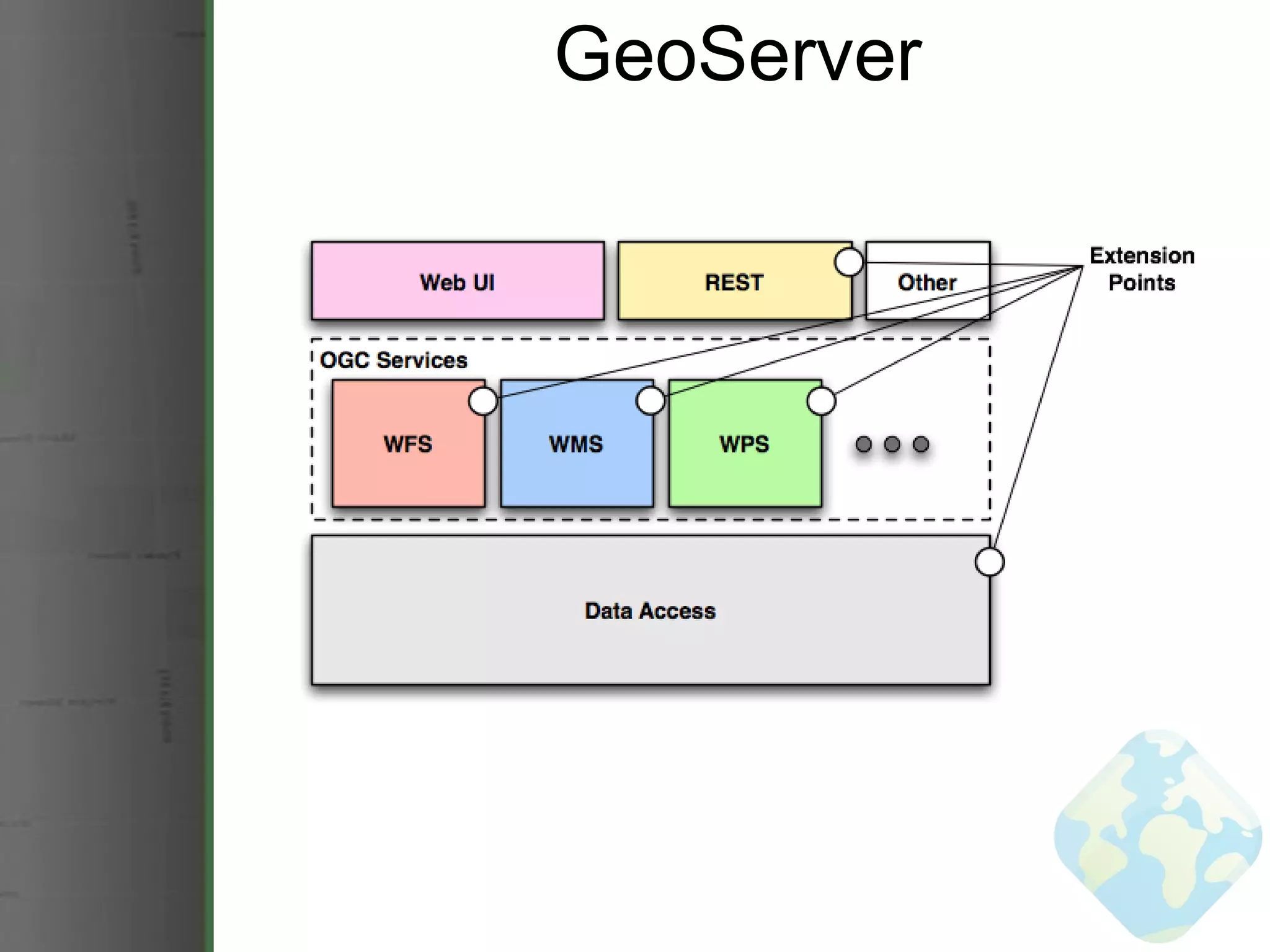
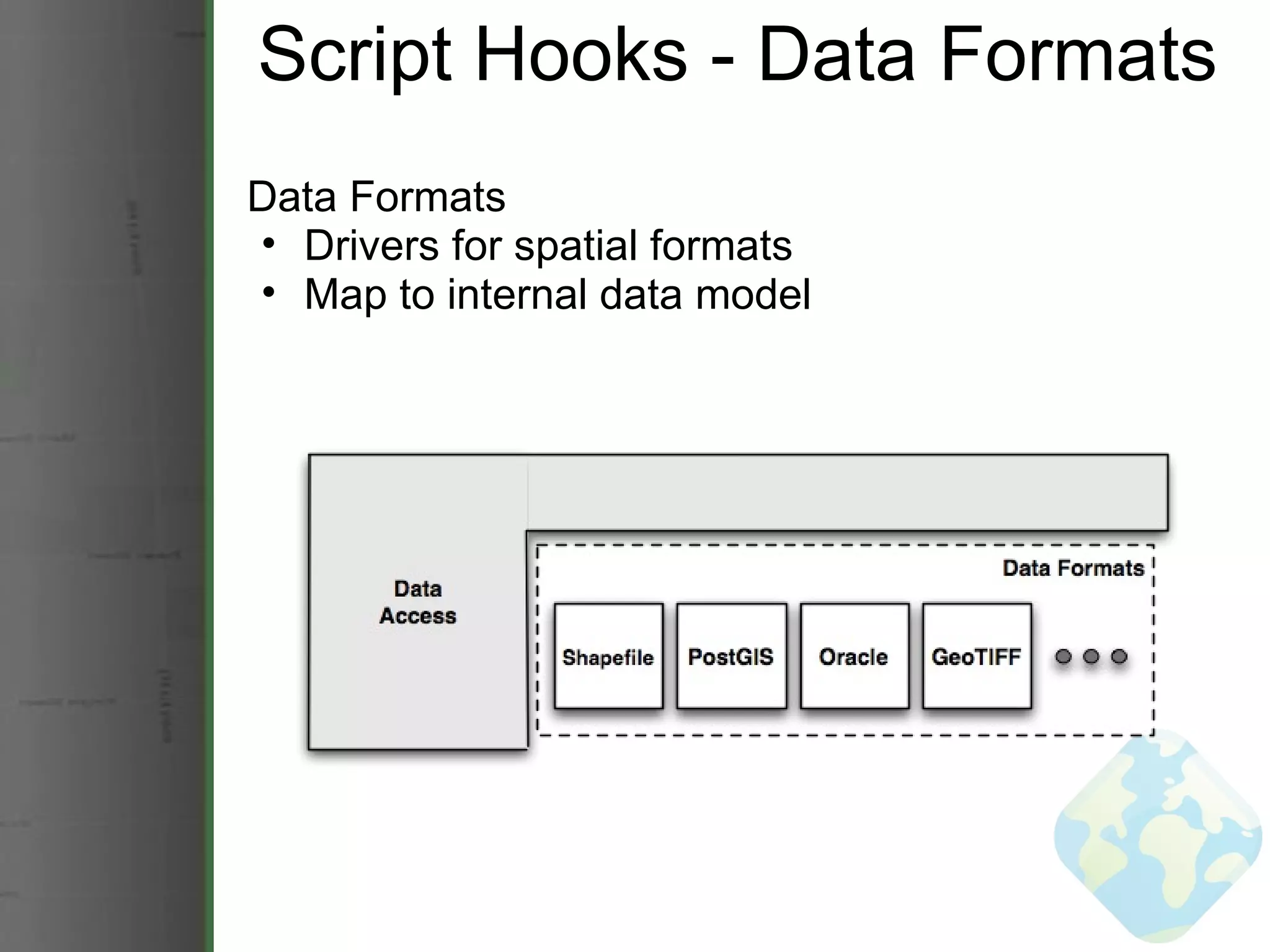
![Script Hooks - Data Formats from geoserver import datastore from geoscript.layer import readJSON class GeoJSON(object): @datastore('GeoJSON', 'GeoJSON', file=('GeoJSON file', str)) def __init__(self, file): self.json = readJSON(file) def layers(self): return [self.json.name] def get(self, layer): return self.json GeoJSON DataStore](https://image.slidesharecdn.com/scriptinggeoserverwithgeoscript-111003093136-phpapp01/75/Scripting-GeoServer-with-GeoScript-10-2048.jpg)
![Script Hooks - Data Formats from geoserver import datastore from geoscript.layer import readJSON class GeoJSON(object): @datastore('GeoJSON', 'GeoJSON', file=('GeoJSON file', str)) def __init__(self, file): self.json = readJSON(file) def layers(self): return [self.json.name] def get(self, layer): return self.json GeoJSON DataStore](https://image.slidesharecdn.com/scriptinggeoserverwithgeoscript-111003093136-phpapp01/75/Scripting-GeoServer-with-GeoScript-11-2048.jpg)
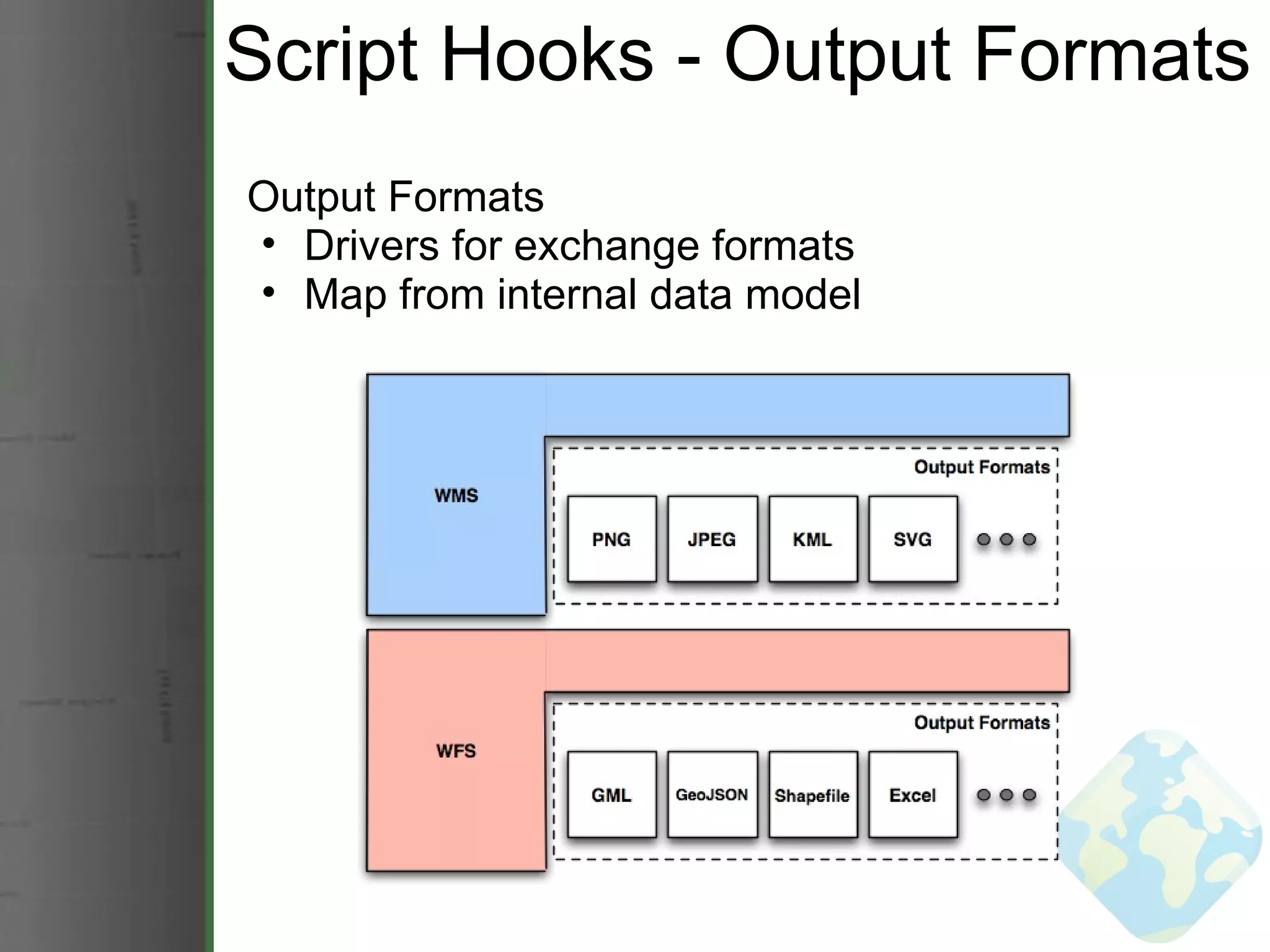
![Script Hooks - Output Formats from geoserver.format import vector_format @vector_format('property', 'text/plain') def write(data, out): for f in data.features: values = [str(val) for val in f.values()] out.write('%s=%s\n' % (f.id, '|'.join(values)) Property File Format states.1=MULTIPOLYGON (((37.51 -88.07, ... 37.51 -88.07)))|Illinois states.2=MULTIPOLYGON (((38.97 -77.00, ... 38.97 -77.01)))|District of Columbia states.3=MULTIPOLYGON (((38.56 -75.71, ... 38.56 -75.71)))|Delaware states.4=MULTIPOLYGON (((38.48 -79.23, ... 38.48 -79.23)))|West Virginia . . . .../wfs?request=GetFeature&typename=topp:states&outputformat=property](https://image.slidesharecdn.com/scriptinggeoserverwithgeoscript-111003093136-phpapp01/75/Scripting-GeoServer-with-GeoScript-13-2048.jpg)
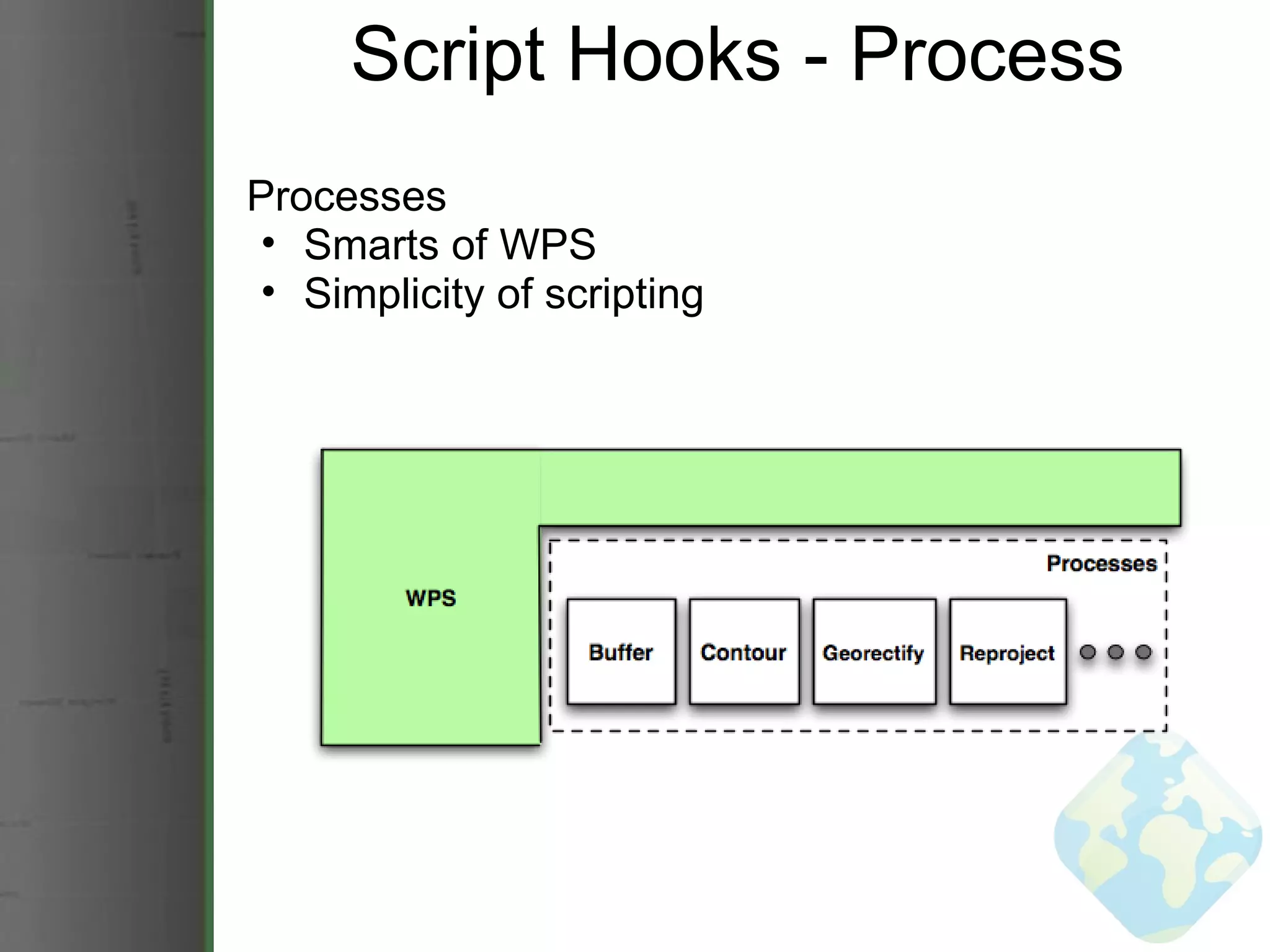
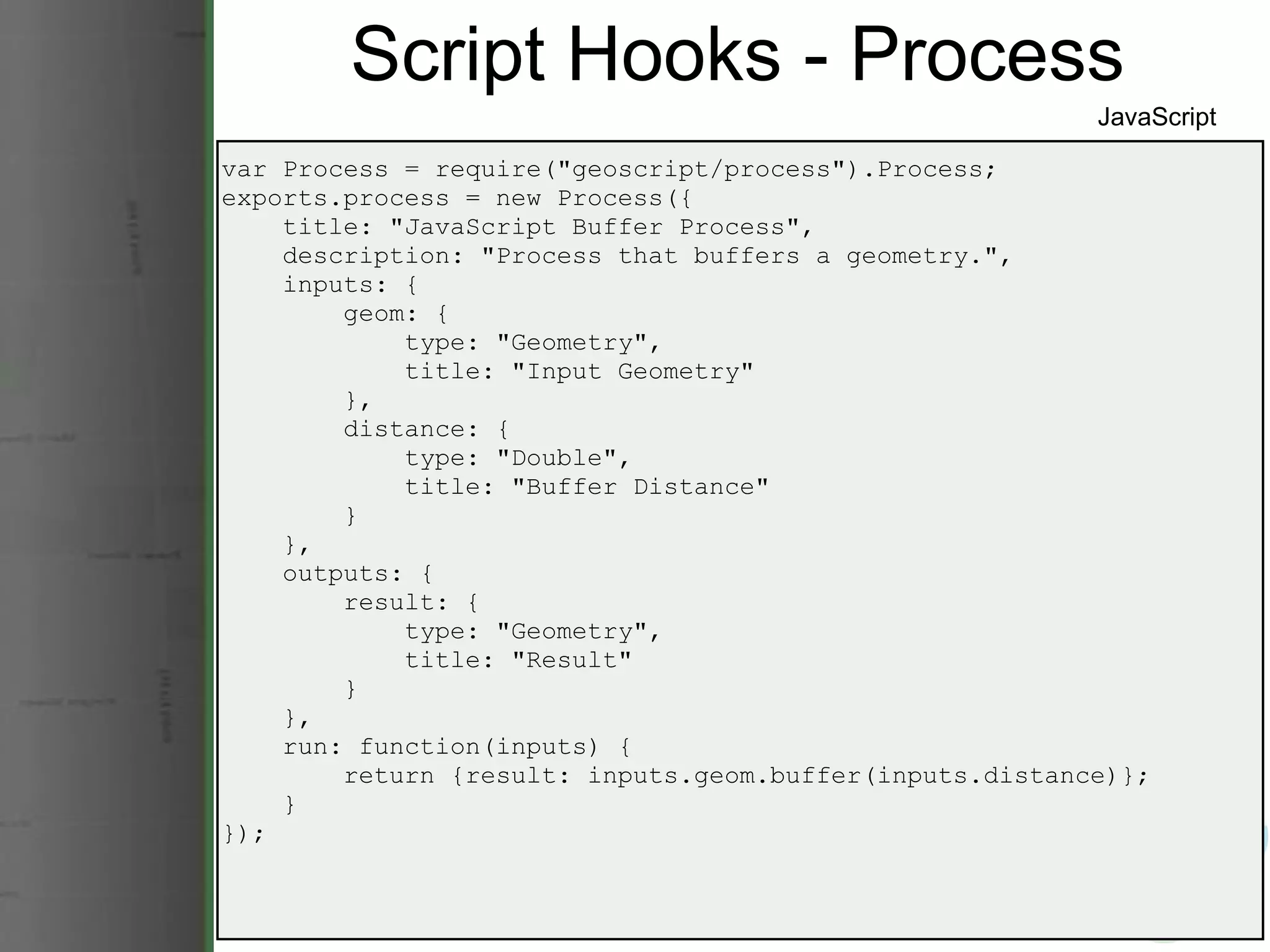
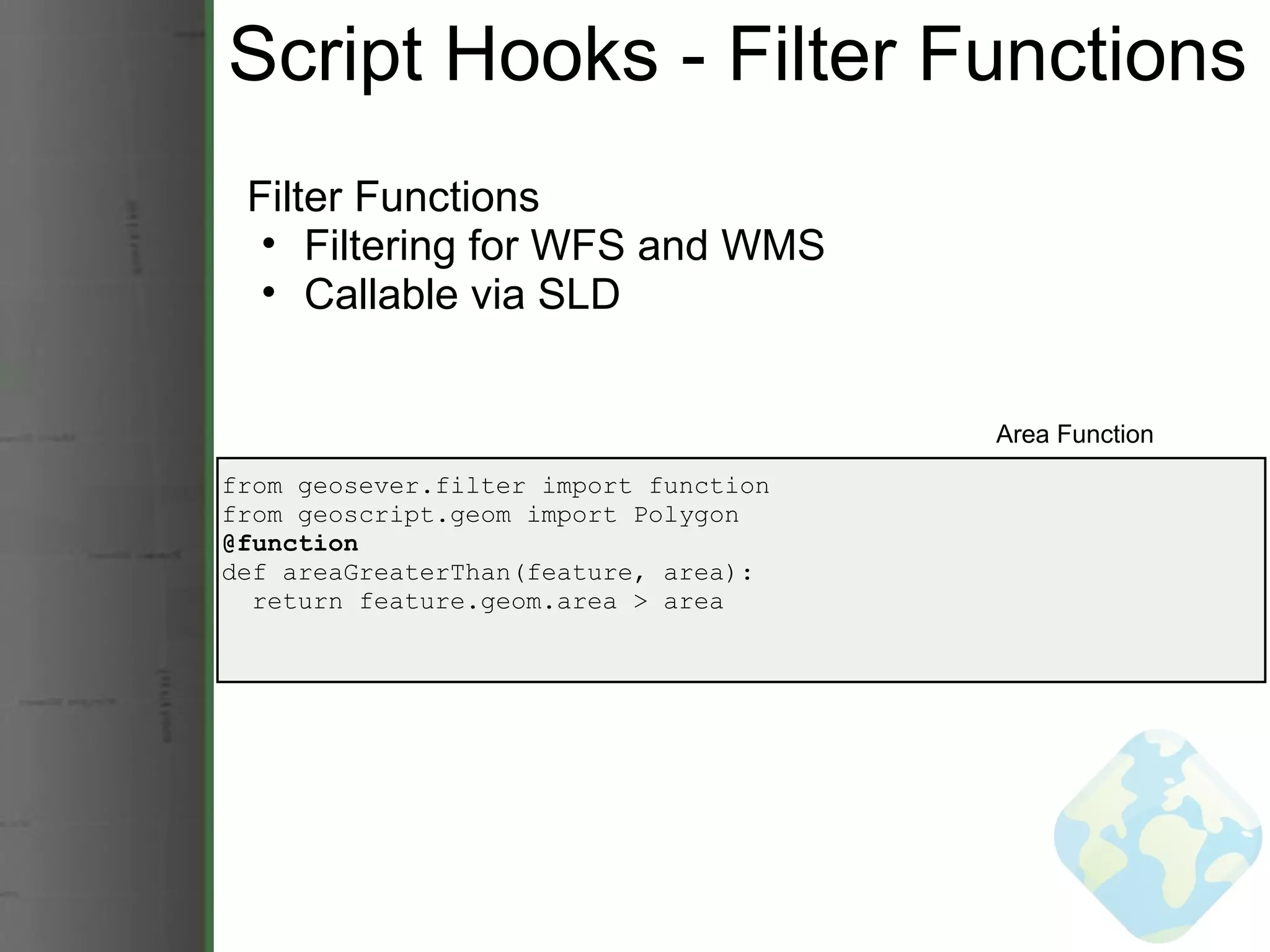
![Script Hooks - Transactions Intercept WFS transactions with a wfs.js script in your data directory. exports.beforeCommit = function(details, request) { LOGGER.info("beforeCommit"); var records = details["PreInsert"] || []; records.forEach(function(record) { var feature = record.feature; feature.geometry = feature.geometry.simplify(10); }); }; JavaScript](https://image.slidesharecdn.com/scriptinggeoserverwithgeoscript-111003093136-phpapp01/75/Scripting-GeoServer-with-GeoScript-17-2048.jpg)
![Script Hooks - Web/HTTP "apps" Simple WGSI-like environment Access to catalog/data def app(environ, start_response): start_response('200 OK', [('Content-type','text/plain')]) return 'Hello world!' Hello World App](https://image.slidesharecdn.com/scriptinggeoserverwithgeoscript-111003093136-phpapp01/75/Scripting-GeoServer-with-GeoScript-18-2048.jpg)
![Data Summary App from geoserver.catalog import Layer from StringIO import StringIO def app(env, start_response): kvp = dict([tuple(kv.split('=')) for kv in env['QUERY_STRING'].split('&')]) layer = kvp['layer'] l = Layer(layer, store=None) buf = StringIO() buf.write('Layer: %s\n' % l.name) data = l.data buf.write(' Format: %s\n' % data.format) buf.write(' Feature count: %d\n' % data.count()) buf.write(' CRS/Projection: %s\n' % data.proj.wkt) b = data.bounds() buf.write(' Bounds: (%f,%f,%f,%f)\n' % (b.west, b.south, b.east, b.north)) buf.write(' Fields:\n') buf.write('\n'.join([' %s' % repr(fld) for fld in data.schema.fields])) buf.write('\n') start_response('200 OK', [('Content-type','text/plain')]) return buf.getvalue()](https://image.slidesharecdn.com/scriptinggeoserverwithgeoscript-111003093136-phpapp01/75/Scripting-GeoServer-with-GeoScript-19-2048.jpg)
![Data Summary App from geoserver.catalog import Layer from StringIO import StringIO def app(env, start_response): kvp = dict([tuple(kv.split('=')) for kv in env['QUERY_STRING'].split('&')]) layer = kvp['layer'] l = Layer(layer, store=None) buf = StringIO() buf.write('Layer: %s\n' % l.name) data = l.data buf.write(' Format: %s\n' % data.format) buf.write(' Feature count: %d\n' % data.count()) buf.write(' CRS/Projection: %s\n' % data.proj.wkt) b = data.bounds() buf.write(' Bounds: (%f,%f,%f,%f)\n' % (b.west, b.south, b.east, b.north)) buf.write(' Fields:\n') buf.write('\n'.join([' %s' % repr(fld) for fld in data.schema.fields])) buf.write('\n') start_response('200 OK', [('Content-type','text/plain')]) return buf.getvalue()](https://image.slidesharecdn.com/scriptinggeoserverwithgeoscript-111003093136-phpapp01/75/Scripting-GeoServer-with-GeoScript-20-2048.jpg)
![Data Summary App from geoserver.catalog import Layer from StringIO import StringIO def app(env, start_response): kvp = dict([tuple(kv.split('=')) for kv in env['QUERY_STRING'].split('&')]) layer = kvp['layer'] l = Layer(layer, store=None) buf = StringIO() buf.write('Layer: %s\n' % l.name) data = l.data buf.write(' Format: %s\n' % data.format) buf.write(' Feature count: %d\n' % data.count()) buf.write(' CRS/Projection: %s\n' % data.proj.wkt) b = data.bounds() buf.write(' Bounds: (%f,%f,%f,%f)\n' % (b.west, b.south, b.east, b.north)) buf.write(' Fields:\n') buf.write('\n'.join([' %s' % repr(fld) for fld in data.schema.fields])) buf.write('\n') start_response('200 OK', [('Content-type','text/plain')]) return buf.getvalue()](https://image.slidesharecdn.com/scriptinggeoserverwithgeoscript-111003093136-phpapp01/75/Scripting-GeoServer-with-GeoScript-21-2048.jpg)
![Data Summary App from geoserver.catalog import Layer from StringIO import StringIO def app(env, start_response): kvp = dict([tuple(kv.split('=')) for kv in env['QUERY_STRING'].split('&')]) layer = kvp['layer'] l = Layer(layer, store=None) buf = StringIO() buf.write('Layer: %s\n' % l.name) data = l.data buf.write(' Format: %s\n' % data.format) buf.write(' Feature count: %d\n' % data.count()) buf.write(' CRS/Projection: %s\n' % data.proj.wkt) b = data.bounds() buf.write(' Bounds: (%f,%f,%f,%f)\n' % (b.west, b.south, b.east, b.north)) buf.write(' Fields:\n') buf.write('\n'.join([' %s' % repr(fld) for fld in data.schema.fields])) buf.write('\n') start_response('200 OK', [('Content-type','text/plain')]) return buf.getvalue()](https://image.slidesharecdn.com/scriptinggeoserverwithgeoscript-111003093136-phpapp01/75/Scripting-GeoServer-with-GeoScript-22-2048.jpg)
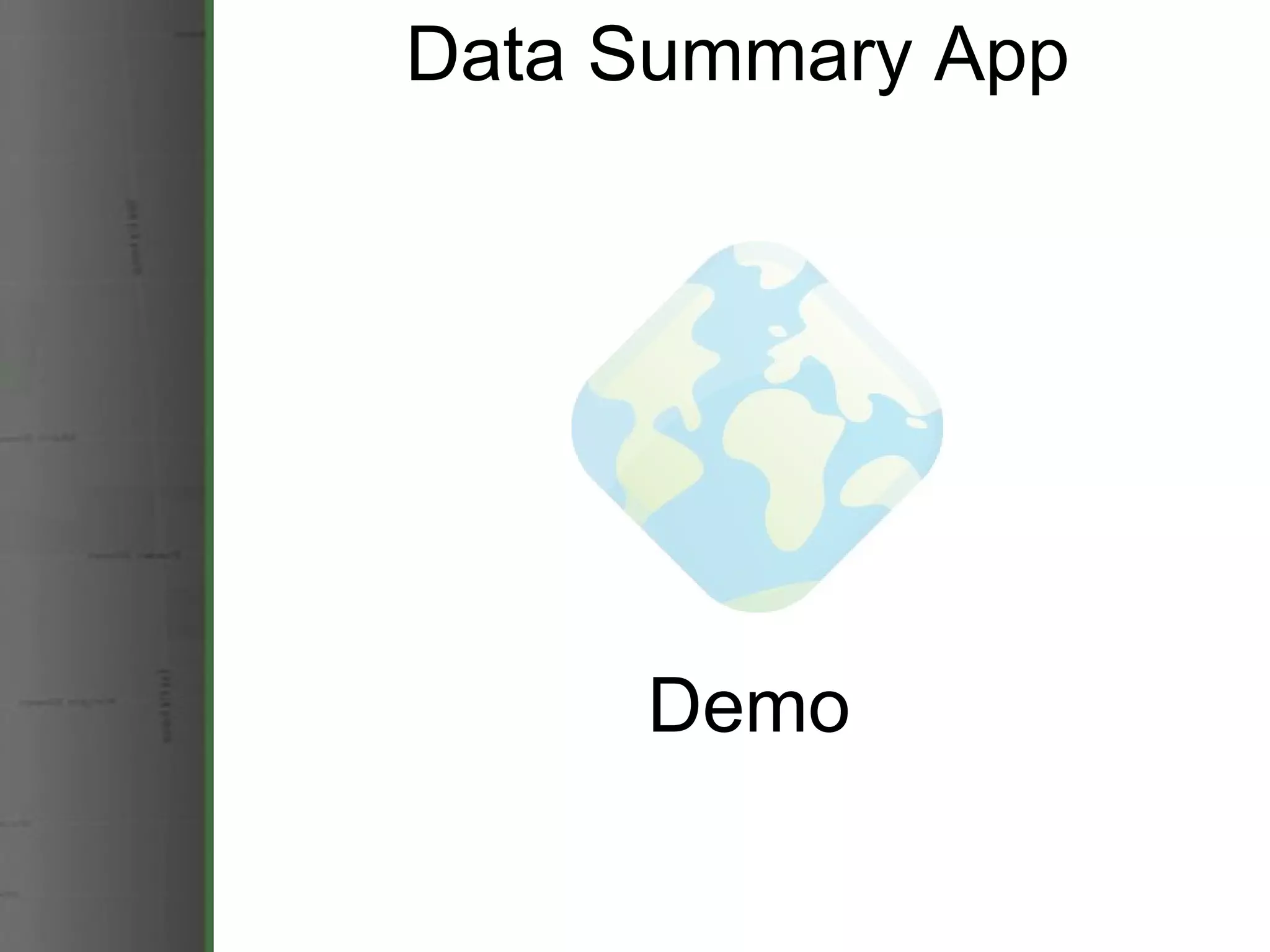
![Fusion Tables DataStore class GFT(object): @datastore('GFT', 'Google Fusion Tables', user=('User email', str), passwd=('Password', str)) def __init__(self, user, passwd): token = ClientLogin().authorize(user, passwd) self.ft = ftclient.ClientLoginFTClient(token) def layers(self): return [tbl.name for tbl in self.tables()] def get(self, layer): try: return Layer(filter(lambda t: t.name == layer, self.tables())[0]) except IndexError: raise Exception('No table named %s' % layer) def tables(self): tables = self.ft.query(SQL().showTables()) return [Table(self,*row.split(',')) for row in tables.split('\n')[1:-1]]](https://image.slidesharecdn.com/scriptinggeoserverwithgeoscript-111003093136-phpapp01/75/Scripting-GeoServer-with-GeoScript-24-2048.jpg)
![Fusion Tables DataStore class GFT(object): @datastore('GFT', 'Google Fusion Tables', user=('User email', str), passwd=('Password', str)) def __init__(self, user, passwd): token = ClientLogin().authorize(user, passwd) self.ft = ftclient.ClientLoginFTClient(token) def layers(self): return [tbl.name for tbl in self.tables()] def get(self, layer): try: return Layer(filter(lambda t: t.name == layer, self.tables())[0]) except IndexError: raise Exception('No table named %s' % layer) def tables(self): tables = self.ft.query(SQL().showTables()) return [Table(self,*row.split(',')) for row in tables.split('\n')[1:-1]]](https://image.slidesharecdn.com/scriptinggeoserverwithgeoscript-111003093136-phpapp01/75/Scripting-GeoServer-with-GeoScript-25-2048.jpg)
![Fusion Tables DataStore class GFT(object): @datastore('GFT', 'Google Fusion Tables', user=('User email', str), passwd=('Password', str)) def __init__(self, user, passwd): token = ClientLogin().authorize(user, passwd) self.ft = ftclient.ClientLoginFTClient(token) def layers(self): return [tbl.name for tbl in self.tables()] def get(self, layer): try: return Layer(filter(lambda t: t.name == layer, self.tables())[0]) except IndexError: raise Exception('No table named %s' % layer) def tables(self): tables = self.ft.query(SQL().showTables()) return [Table(self,*row.split(',')) for row in tables.split('\n')[1:-1]]](https://image.slidesharecdn.com/scriptinggeoserverwithgeoscript-111003093136-phpapp01/75/Scripting-GeoServer-with-GeoScript-26-2048.jpg)
![Fusion Tables DataStore class GFT(object): @datastore('GFT', 'Google Fusion Tables', user=('User email', str), passwd=('Password', str)) def __init__(self, user, passwd): token = ClientLogin().authorize(user, passwd) self.ft = ftclient.ClientLoginFTClient(token) def layers(self): return [tbl.name for tbl in self.tables()] def get(self, layer): try: return Layer(filter(lambda t: t.name == layer, self.tables())[0]) except IndexError: raise Exception('No table named %s' % layer) def tables(self): tables = self.ft.query(SQL().showTables()) return [Table(self,*row.split(',')) for row in tables.split('\n')[1:-1]]](https://image.slidesharecdn.com/scriptinggeoserverwithgeoscript-111003093136-phpapp01/75/Scripting-GeoServer-with-GeoScript-27-2048.jpg)
![Fusion Tables DataStore __types = {'string':str, 'number': float, 'location':Geometry} class Layer(object): def __init__(self, tbl): self.tbl = tbl self.name = tbl.name self.workspace = tbl.gft self.proj = Projection('epsg:4326') self.schema = Schema(tbl.name, [(col[0], __types[col[1]]) for col in tbl.schema()]) def bounds(self): return reduce(lambda x,y: x.expand(y.bounds), self.features(), Bounds()) def features(self): ...](https://image.slidesharecdn.com/scriptinggeoserverwithgeoscript-111003093136-phpapp01/75/Scripting-GeoServer-with-GeoScript-28-2048.jpg)
![Fusion Tables DataStore __types = {'string':str, 'number': float, 'location':Geometry} class Layer(object): def __init__(self, tbl): self.tbl = tbl self.name = tbl.name self.workspace = tbl.gft self.proj = Projection('epsg:4326') self.schema = Schema(tbl.name, [(col[0], __types[col[1]]) for col in tbl.schema()]) def bounds(self): return reduce(lambda x,y: x.expand(y.bounds), self.features(), Bounds()) def features(self): ...](https://image.slidesharecdn.com/scriptinggeoserverwithgeoscript-111003093136-phpapp01/75/Scripting-GeoServer-with-GeoScript-29-2048.jpg)
![Fusion Tables DataStore __types = {'string':str, 'number': float, 'location':Geometry} class Layer(object): def __init__(self, tbl): self.tbl = tbl self.name = tbl.name self.workspace = tbl.gft self.proj = Projection('epsg:4326') self.schema = Schema(tbl.name, [(col[0], __types[col[1]]) for col in tbl.schema()]) def bounds(self): return reduce(lambda x,y: x.expand(y.bounds), self.features(), Bounds()) def features(self): ...](https://image.slidesharecdn.com/scriptinggeoserverwithgeoscript-111003093136-phpapp01/75/Scripting-GeoServer-with-GeoScript-30-2048.jpg)
![Fusion Tables DataStore class Layer(object): ... def features(self): rows = self.tbl.gft.ft.query(SQL().select(self.tbl.id)) rows = rows.split('\n')[1:-1] for row in rows: vals = csv.reader([row]).next() atts = [] for i in range(0, len(vals)): val = vals[i] fld = self.schema.get(i) if issubclass(fld.typ, Geometry): val = readKML(val) atts.append(val) yield Feature(atts, schema=self.schema)](https://image.slidesharecdn.com/scriptinggeoserverwithgeoscript-111003093136-phpapp01/75/Scripting-GeoServer-with-GeoScript-31-2048.jpg)
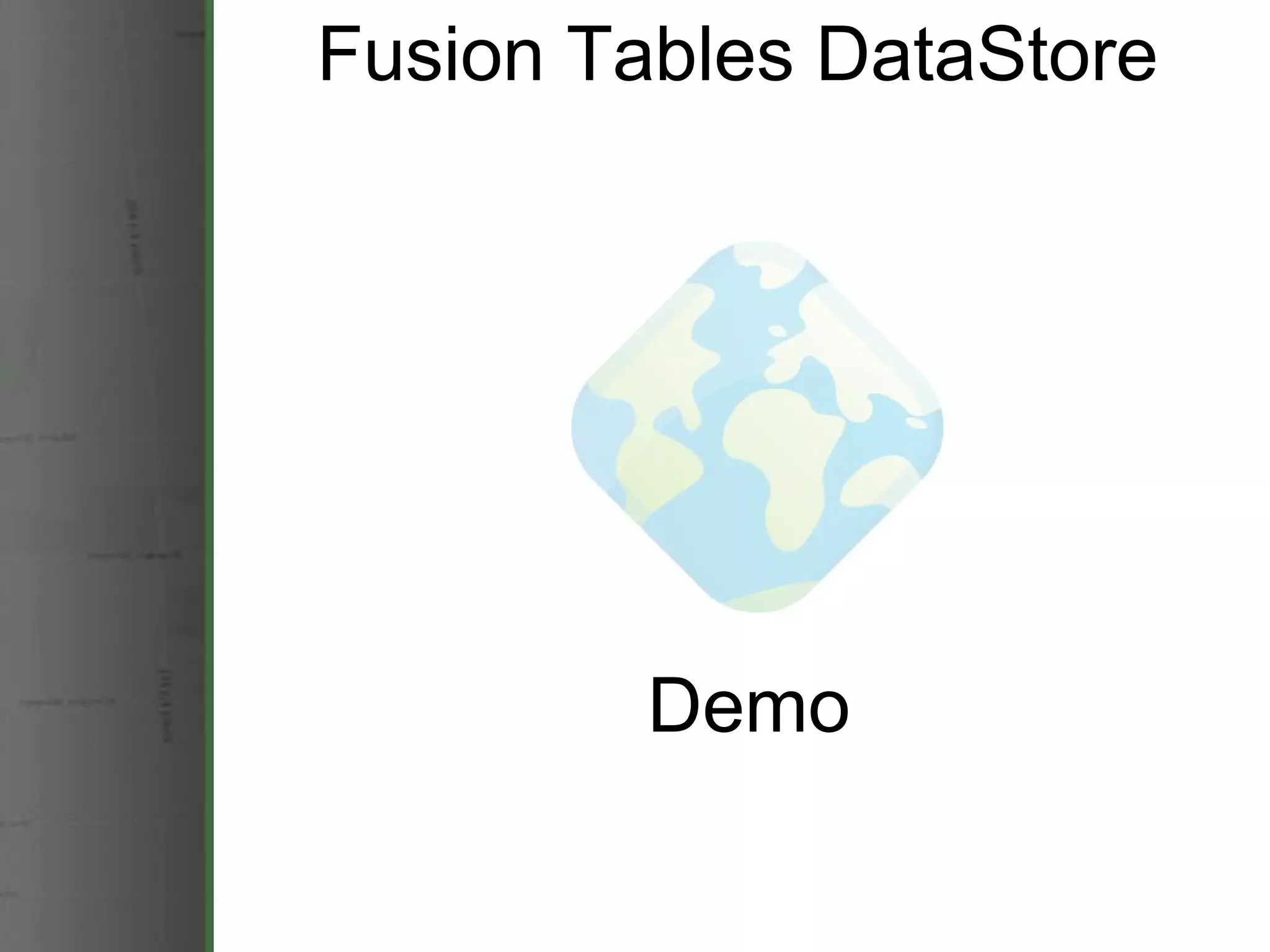
![H2 Output Format @vector_format('h2', 'application/zip') def write(data, out): dir = tempfile.mkdtemp() # create the database and copy the features into it db = H2(data.schema.name, dir=dir) layer = db.create(schema=data.schema) for f in data.features: layer.add(f) db.close() # zip and ship file = tempfile.mktemp() zip = zipfile.ZipFile(file, 'w') for root, dirs, files in os.walk(dir): name = abspath(root)[len(abspath(dir)):] for f in files: zip.write(join(root,f), join(name,f), zipfile.ZIP_DEFLATED) zip.close() shutil.copyfileobj(open(file, 'r'), out) # clean up os.remove(file) shutil.rmtree(dir)](https://image.slidesharecdn.com/scriptinggeoserverwithgeoscript-111003093136-phpapp01/75/Scripting-GeoServer-with-GeoScript-33-2048.jpg)
![H2 Output Format @vector_format('h2', 'application/zip') def write(data, out): dir = tempfile.mkdtemp() # create the database and copy the features into it db = H2(data.schema.name, dir=dir) layer = db.create(schema=data.schema) for f in data.features: layer.add(f) db.close() # zip and ship file = tempfile.mktemp() zip = zipfile.ZipFile(file, 'w') for root, dirs, files in os.walk(dir): name = abspath(root)[len(abspath(dir)):] for f in files: zip.write(join(root,f), join(name,f), zipfile.ZIP_DEFLATED) zip.close() shutil.copyfileobj(open(file, 'r'), out) # clean up os.remove(file) shutil.rmtree(dir)](https://image.slidesharecdn.com/scriptinggeoserverwithgeoscript-111003093136-phpapp01/75/Scripting-GeoServer-with-GeoScript-34-2048.jpg)
![H2 Output Format @vector_format('h2', 'application/zip') def write(data, out): dir = tempfile.mkdtemp() # create the database and copy the features into it db = H2(data.schema.name, dir=dir) layer = db.create(schema=data.schema) for f in data.features: layer.add(f) db.close() # zip and ship file = tempfile.mktemp() zip = zipfile.ZipFile(file, 'w') for root, dirs, files in os.walk(dir): name = abspath(root)[len(abspath(dir)):] for f in files: zip.write(join(root,f), join(name,f), zipfile.ZIP_DEFLATED) zip.close() shutil.copyfileobj(open(file, 'r'), out) # clean up os.remove(file) shutil.rmtree(dir)](https://image.slidesharecdn.com/scriptinggeoserverwithgeoscript-111003093136-phpapp01/75/Scripting-GeoServer-with-GeoScript-35-2048.jpg)
![H2 Output Format @vector_format('h2', 'application/zip') def write(data, out): dir = tempfile.mkdtemp() # create the database and copy the features into it db = H2(data.schema.name, dir=dir) layer = db.create(schema=data.schema) for f in data.features: layer.add(f) db.close() # zip and ship file = tempfile.mktemp() zip = zipfile.ZipFile(file, 'w') for root, dirs, files in os.walk(dir): name = abspath(root)[len(abspath(dir)):] for f in files: zip.write(join(root,f), join(name,f), zipfile.ZIP_DEFLATED) zip.close() shutil.copyfileobj(open(file, 'r'), out) # clean up os.remove(file) shutil.rmtree(dir)](https://image.slidesharecdn.com/scriptinggeoserverwithgeoscript-111003093136-phpapp01/75/Scripting-GeoServer-with-GeoScript-36-2048.jpg)
